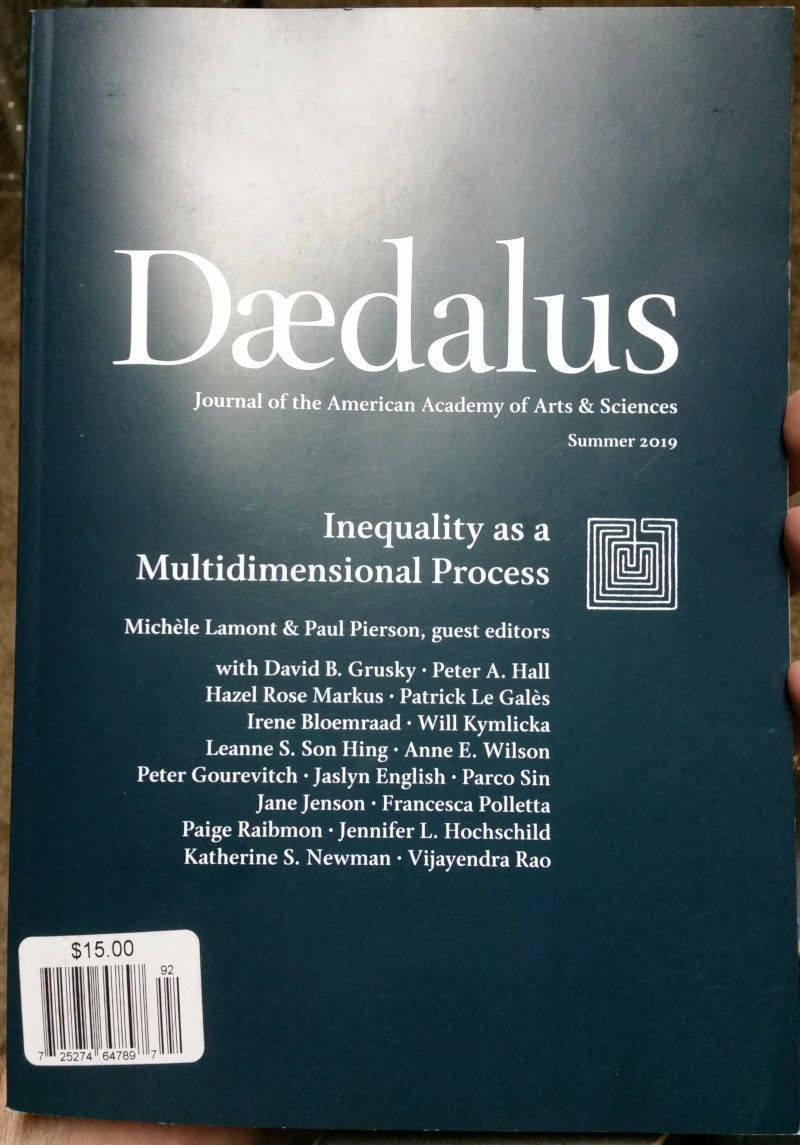
Noted recall: The goal is to describe, in just a few words, what the article is about. Additionally, if I think the article is particularly note-worthy (good or bad), I will comment on that. Compare this to a small sticky note, something to jog your memory about the contents of an article. Of course, if I miss the point of an article, or fail to find anything remarkable, that is entirely the fault of the reviewer.
Available at: https://www.amacad.org/daedalus/inequality-multidimensional-process

The Rise of Opportunity Markets: How Did It Happen & What Can We Do? - David B. Grusky, Peter A. Hall, & Hazel Rose Markus
(read 2019/09/09)
Discusses the neoliberal transformation of education opportunity. That access to better elementary and grade schools correlates with higher income earnings; and this is access by being able to afford better neighborhoods. Similar for high school. But also in the high school time frame is the importance of building a "merit" resume, good grades, but also standardized test scores and volunteering, and this is better achieved with higher income. A final notable part of the diagnosis is the concept of a "neoliberal self," that is, a middle or upper class cultural identity; contrasted with a self-identity from lower incomes which, even when successful at college, identifies less with peers and is more likely to drop out. The proposed solution is a form of economic affirmative action (separate from racial affirmative action) at the college level, a compromise cheaper than increasing all pre-college education. This is supposedly implemented in other countries, and would evaluate admissions in, say, economic deciles.
Membership without Social Citizenship? Deservingness & Redistribution as Grounds for Equality - Irene Bloemraad, Will Kymlicka, Michèle Lamont & Leanne S. Son Hing
(read 2019/09/10)
This is a really good article. Talks about increase of inclusiveness in national (legal, cultural) identity groups compared to mid 20th century; that ethnic identity or where you were born is less important to be identified as a citizen in western countries than in the past. But simultaneously, harsher judgments than in the past over who "deserves" public assistance. Article states correlation between the two is not established, but discusses some possible reasons why deservingness is judged more harshly, in the context of the first point.
Failure to Respond to Rising Income Inequality: Processes That Legitimize Growing Disparities - Leanne S. Son Hing, Anne E. Wilson, Peter Gourevitch, Jaslyn English, & Parco Sin
(read 2019/09/11)
This is another really good article. This is about public perceptions and reactions to income inequality. Key point is that as income inequality rises, there is less government policy to address this. Generally (across nations), income inequality is underestimated (in the US), but it is sometimes over estimated too (other countries). With more inequality, people seem to accept or justify this, for various reasons; in the US, there is a strong belief in meritocracy that legitimizes income inequality. Other factors than meritocracy (see article), but worth pointing out that policies that benefit minorites as well as the majority group are unpopular.